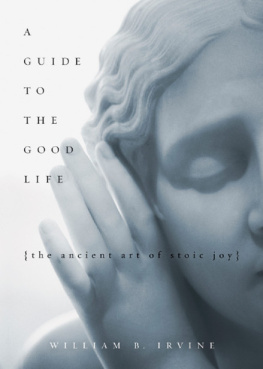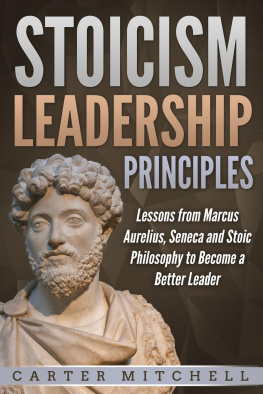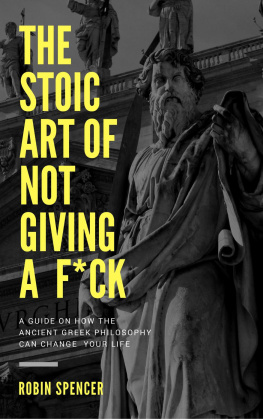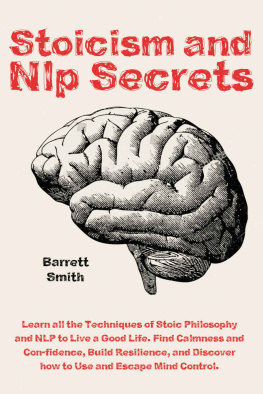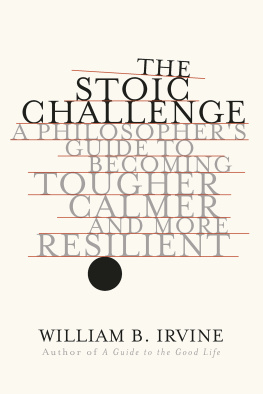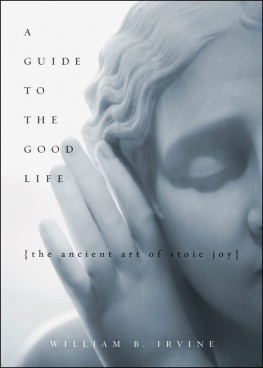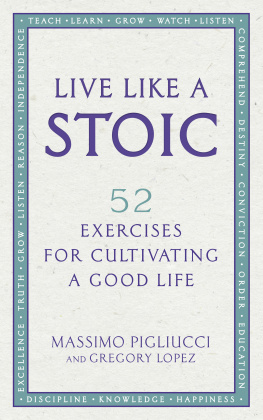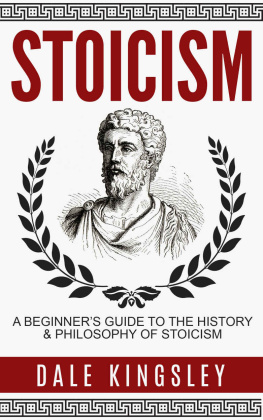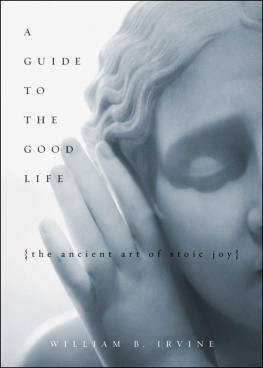F I V E
The Dichotomy of Control
On Becoming Invincible
Our most important choice in life, according to Epictetus, is whether to concern ourselves with things external to us or things internal. Most people choose the former because they think harms and benefits come from outside themselves.
According to Epictetus, though, a philosopherby which he means someone who has an understanding of Stoic philosophywill do just the opposite. He will look for all benefit and harm to come from himself.1 In particular, he will give up the rewards the external world has to offer in order to gain tranquility, freedom, and calm.2
In offering this advice, Epictetus is turning the normal logic of desire fulfillment on its head. If you ask most people how to gain contentment, they will tell you that you must work to get it: You must devise strategies by which to fulfill your desires and then implement those strategies. But as Epictetus points out, It is impossible that happiness, and yearning for what is not present, should ever be united.3 A better strategy for getting what you want, he says, is to make it your goal to want only those things that are easy to obtainand ideally to want only those things that you can be certain of obtaining.
While most people seek to gain contentment by changing the world around them, Epictetus advises us to gain contentment by changing ourselvesmore precisely, by changing our desires. And he is not alone in giving this advice; indeed, it is the advice offered by virtually every philosopher and religious thinker who has reflected on human desire and the causes of human dissatisfaction.4 They agree that if what you seek is contentment, it is better and easier to change yourself and what you want than it is to change the world around you.
Your primary desire, says Epictetus, should be your desire not to be frustrated by forming desires you wont be able to fulfill. Your other desires should conform to this desire, and if they dont, you should do your best to extinguish them. If you succeed in doing this, you will no longer experience anxiety about whether or not you will get what you want; nor will you experience disappointment on not getting what you want.
Indeed, says Epictetus, you will become invincible: If you refuse to enter contests that you are capable of losing, you will never lose a contest.5 E p i c t et u s s H a n d b o o k o pe n s , somewhat famously, with the following assertion: Some things are up to us and some are not up to us. He offers our opinions, impulses, desires, and aversions as examples of things that are up to us, and our possessions and reputation as examples of things that arent.6
From this assertion it follows that we are faced with a choice in the desires we form: We can want things that are up to us, or we can want things that are not up to us.
If we want things that are not up to us, though, we will sometimes fail to get what we want, and when this happens, we will meet misfortune and feel thwarted, miserable, and upset.7 In particular, Epictetus says, it is foolish for us to want friends and relatives to live forever, since these are things that arent up to us.8
Suppose we get lucky, and after wanting something that is not up to us, we succeed in getting it. In this case, we will not end up feeling thwarted, miserable, and upset, but during the time we wanted the thing that is not up to us, we probably experienced a degree of anxiety: Since the thing is not up to us, there was a chance that we wouldnt get it, and this probably worried us. Thus, wanting things that are not up to us will disrupt our tranquility, even if we end up getting them. In conclusion, whenever we desire something that is not up to us, our tranquility will likely be disturbed: If we dont get what we want, we will be upset, and if we do get what we want, we will experience anxiety in the process of getting it.
Consider again Epictetuss dichotomy of control: He says that some things are up to us and some things arent up to us. The problem with this statement of the dichotomy is that the phrase some things arent up to us is ambiguous: It can be understood to mean either There are things over which we have no control at all or to mean There are things over which we dont have complete control. If we understand it in the first way, we can restate Epictetuss dichotomy as follows: There are things over which we have complete control and things over which we have no control at all. But stated in this way, the dichotomy is a false dichotomy, since it ignores the existence of things over which we have some but not complete control.
Consider, for example, my winning a tennis match. This is not something over which I have complete control: No matter how much I practice and how hard I try, I might nevertheless lose a match. Nor is it something over which I have no control at all: Practicing a lot and trying hard may not guarantee that I will win, but they will certainly affect my chances of winning.
My winning at tennis is therefore an example of something over which I have some control but not complete control. This suggests that we should understand the phrase some things arent up to us in the second way: We should take it to mean that there are things over which we dont have complete control. If we accept this interpretation, we will want to restate Epictetuss dichotomy of control as follows: There are things over which we have complete control and things over which we dont have complete control. Stated in this way, the dichotomy is a genuine dichotomy. Let us therefore assume that this is what Epictetus meant in saying that some things are up to us and some things are not up to us. Now let us turn our attention to the second branch of this dichotomy, to things over which we dont have complete control. There are two ways we can fail to have complete control over something: We might have no control at all over it, or we might have some but not complete control. This means that we can divide the category of things over which we dont have complete control into two subcategories: things over which we have no control at all (such as whether the sun will rise tomorrow) and things over which we have some but not complete control (such as whether we win at tennis). This in turn suggests the possibility of restating Epictetuss dichotomy of control as a trichotomy: There are things over which we have complete control, things over which we have no control at all, and things over which we have some but not complete control. Each of the things we encounter in life will fall into one and only one of these three categories.
I n h i s stat e m e n t of the dichotomy of control, Epictetus suggests, quite sensibly, that we are behaving foolishly if we spend time worrying about things that are not up to us; because they are not up to us, worrying about them is futile.
We should instead concern ourselves with things that are up to us, since we can take steps either to bring them about or prevent them from happening. On restating the dichotomy of control as a trichotomy, though, we must restate his advice regarding what is and isnt sensible to worry about.
To begin with, it makes sense for us to spend time and energy concerning ourselves with things over which we have complete control. In these cases, our efforts will have guaranteed results. Notice, too, that because of the degree of control we have over these things, it will generally require relatively little time and energy for us to make sure they come about.
We would be foolish not to concern ourselves with them.
What are the things over which we have complete control?
In the passage quoted above, Epictetus says we have complete control over our opinions, impulses, desires, and aversions.
I agree with Epictetus that we have complete control over our opinions, as long as we properly construe the meaning of opinionmore on this in a moment. I have qualms, though, about including our impulses, desires, and aversions in the category of things over which we have complete control. I would instead place them into the category of things over which we have some but not complete control, or, in some cases, into the category of things over which we have no control at all. Allow me to explain why.
Next page
